This post may contain affiliate links. Please read our disclosure policy.
It doesn’t get better than beef Massaman curry made from scratch! I slow-cook this rich, fragrant Thai curry with juicy beef chunks, potatoes, smoky chilies, and coconut milk until the meat is fall-apart-tender and the sauce is rich and flavorful.
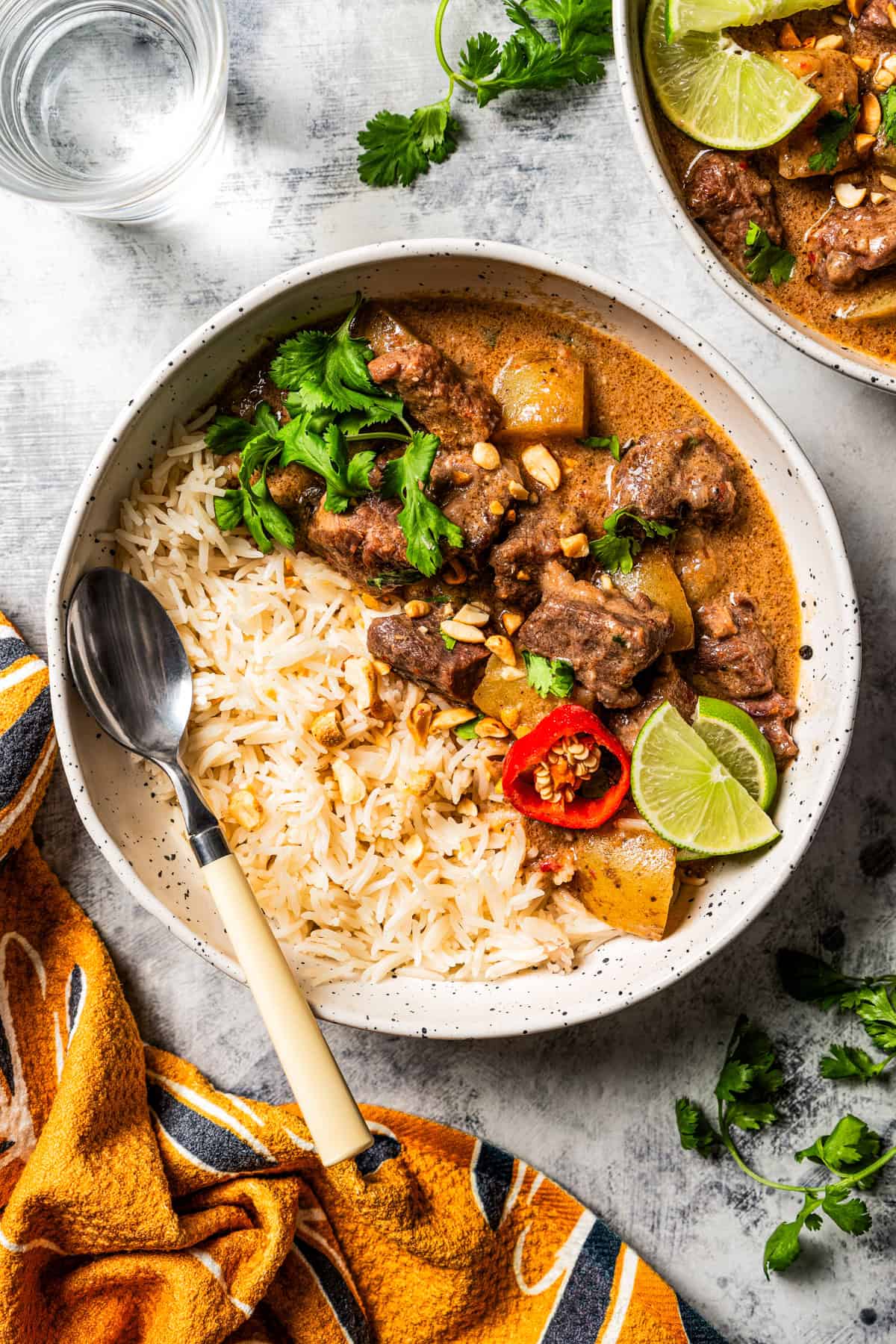
This Massaman curry might be some of my best work. It’s a rich, flavorful Thai coconut curry brimming with aromatic spices, tender, fall-apart beef chunks, and smoky chili heat that’s softened by the coconut milk. Of course, in true Massaman style, I couldn’t forget a sprinkle of crunchy roasted peanuts and cilantro for garnish. Piled over rice, it was love at first bite. This curry takes a bit of time to make, but it’s the perfect dish for a Sunday afternoon. The effort is SO worth it!
Reasons To Make My Massaman Curry Recipe
- All the flavor. Curry is one of the first things to come to mind when I think of BIG flavor. This Massaman curry recipe has plenty of it, infused in every saucy bite. It’s mildly spicy (but easy to adapt), savory-sweet, and filled with umami. The beef and potatoes soak that all up. Too good!
- Easy ingredients. My homemade Massaman curry paste uses a lot of pantry spices you’ll recognize, plus a few easy-to-find extras that most grocery stores have in the international food aisle. I wanted a recipe that recreated the bold flavors I love without going wild with exotic ingredients.
- Low and slow. There’s some prep involved in making the curry paste and getting the ingredients cubed, chopped, and diced, but this recipe becomes pretty hands-off once the cooking starts. I cook this low and slow to bring out all the flavor, so most of the work gets left to my stovetop.
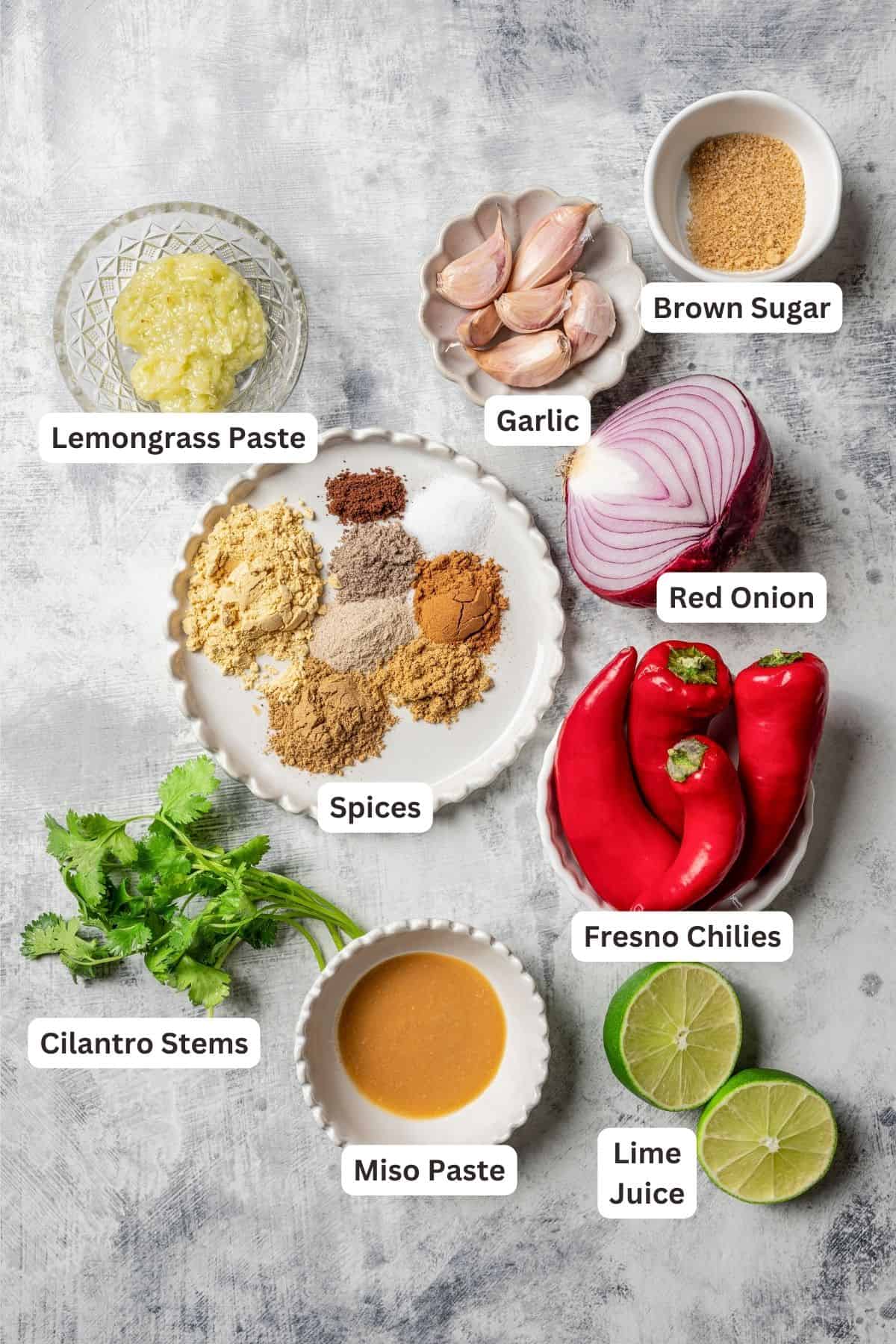
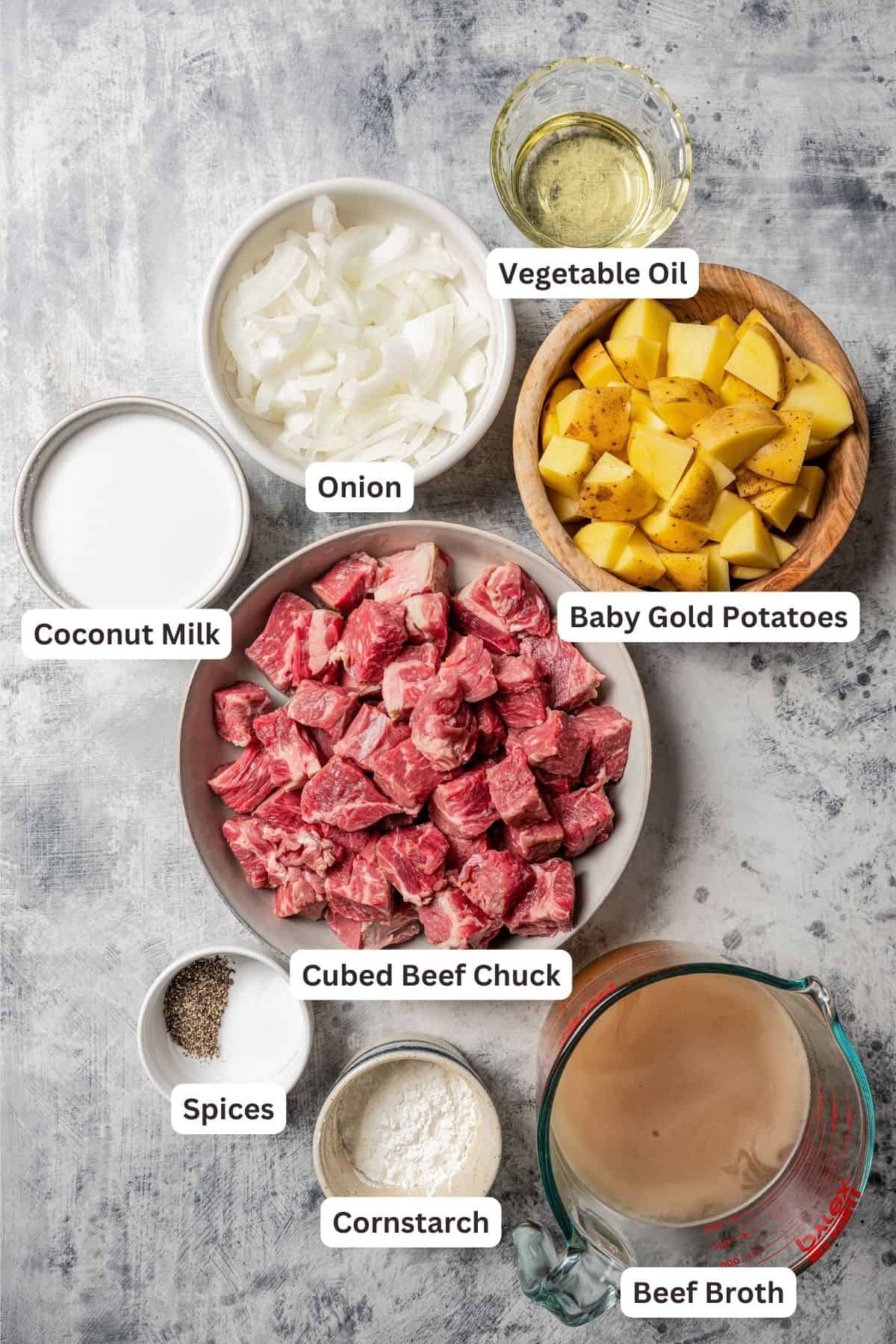
Recipe Ingredients
Massaman curry is a fragrant, rich, and slightly spicy mash-up of Thai and Indian-style curries, so the ingredients reflect a little bit of both. It uses popular Indian spices like cumin, coriander, cinnamon, and cloves, with Malay influences in the Thai red-style curry paste.
For the Massaman Curry Paste
- Spices – You’ll need ground cumin, white pepper (or black pepper in a pinch), ginger, cardamom, cloves, and cinnamon.
- Chilies – I use Fresno chilies since they’re easy to find in the US. Good substitutes for Fresno chilies are jalapeño or chipotle peppers, which both have the smokiness we’re after. I recommend seeding the peppers to take the heat off a little.
- Lemongrass Paste – You’ll find this in the international food aisle near other Asian cooking ingredients. Fresh lemongrass is quite tough, but if you can find some, you can grind it into a paste yourself.
- Garlic – Fresh cloves, please!
- Red Onion – Another mild onion will also work here, like yellow onion or sweet Vidalia onion. Dice it up finely.
- Cilantro – Just the stems! Cilantro stems add texture, plus they’re packed full of flavor. If you don’t have cilantro, parsley stems or Thai basil stems will work, too.
- Miso Paste – Also found in the international food aisle. Miso is a thick paste made from fermented soybeans. It’s the secret to loads of umami flavor in recipes like my Japanese pork katsu.
- Brown Sugar – Granulated sugar or another sweetener, like honey or agave, would work here, too.
- Lime Juice – Freshly squeezed lime juice is best, but bottled is fine in a pinch.
Curry Ingredients
- Beef Chuck – Cut into cubes. Other good slow-cooking cuts for curry are beef shanks (like what you’d use for osso buco), tri-tip, or short ribs.
- Cornstarch – We’re going to “velvet” the beef cubes before we cook them. Velveting means coating the beef in cornstarch, which helps tenderize the meat. It’s an easy trick used by Asian restaurants that makes the beef in this curry extra juicy and tender.
- Vegetable Oil – Canola oil or avocado oil are good choices.
- Coconut Milk – You’ll want to use a can of full-fat coconut milk, or coconut cream, which will yield a thicker curry. Just make sure that you don’t buy cream of coconut, which is VERY sweet and won’t work here.
- Onion – Thinly sliced.
- Potatoes – I like a small, tender variety, like baby gold potatoes. I’d recommend any potato that is waxy, and not starchy.
- Peanuts – Roasted peanuts are a signature ingredient in Massaman curries. They add extra richness and delicious crunch! Obviously, feel free to skip them if you’re nut-free.
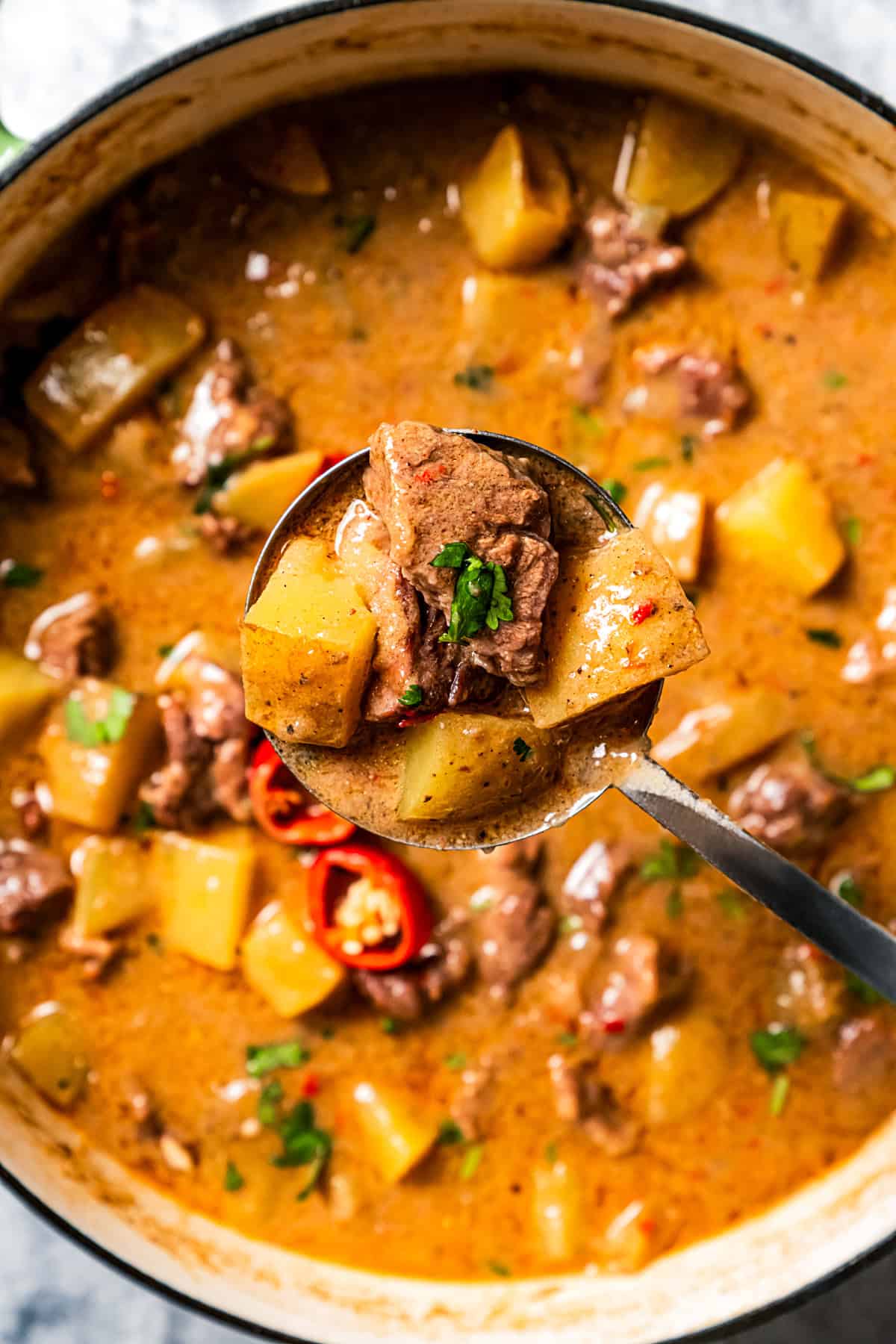
Do I Have to Use Beef?
Slow-cooking beef is the most common choice for Massaman curry, but you can make it with just about any protein. The simmering method is easy to adapt to leaner cuts and proteins like chicken, which cook faster. If you’d prefer a chicken curry, consider using the cooking instructions for my chicken rogan josh as a reference.
To make a vegetarian Massaman curry instead, leave out the beef and replace it with extra potatoes, or other slow-cooking vegetables like butternut and carrots. You can bulk up the protein with add-ins like chickpeas, too.
Tips and Variations
- Don’t undercook the beef. Undercooked beef chuck will be tough, and not fall-apart-tender. Make sure that the beef simmers for a good couple of hours for best results.
- Use a quicker cooking cut. Curries are best when they’re cooked low and slow, but if you don’t have hours to spare, you can prepare this recipe with a leaner beef cut, like flank steak or skirt steak. It won’t have quite as much flavor but it’ll cook faster.
- Avoid a watery curry. Make sure to correctly measure liquid ingredients, like broth, and simmer the curry for long enough to cook off the excess liquid. Simmering makes the meat ultra-tender and gives the sauce a chance to thicken.
- More veggies. On top of potatoes, you can use any veggies you’d like in this curry. Sweet potatoes, squash, carrots, and bell peppers are all good options. Just be sure to take note of cooking times and add the veggies at the right point.
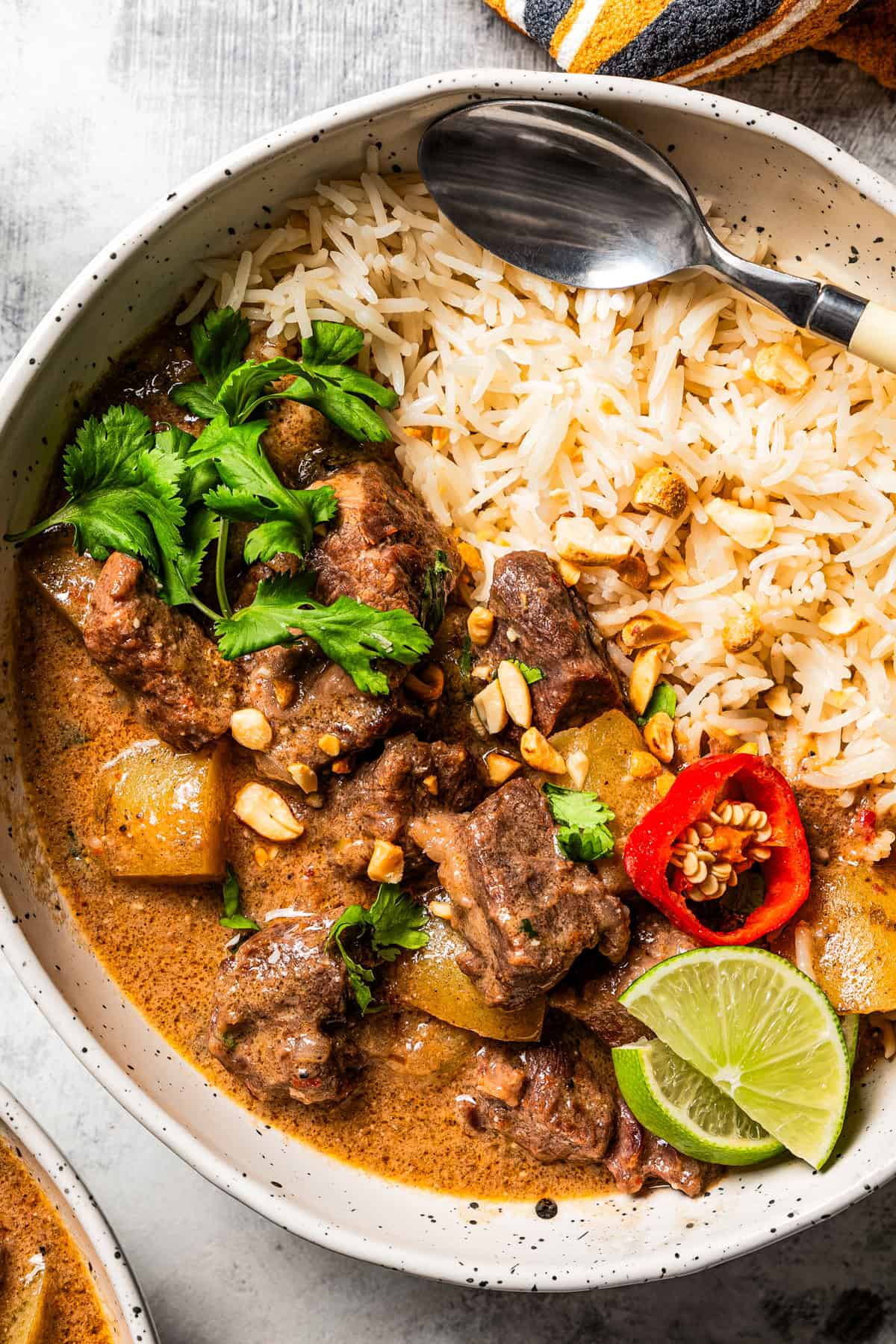
What to Serve With Curry
My favorite way to serve Massaman curry is over a bed of white rice or cumin rice to soak up the flavors in the sauce. Of course, no curry dinner is complete without fluffy naan bread for the same reason!
This homemade curry is also delicious with vegetable biryani rice, which works well as a starter, too, with chicken satay on the side. And if I’m looking for more ways to round out a meal, I’ll make a batch of savory samosas or Indian samosa chaat (an Indian-style snack platter).
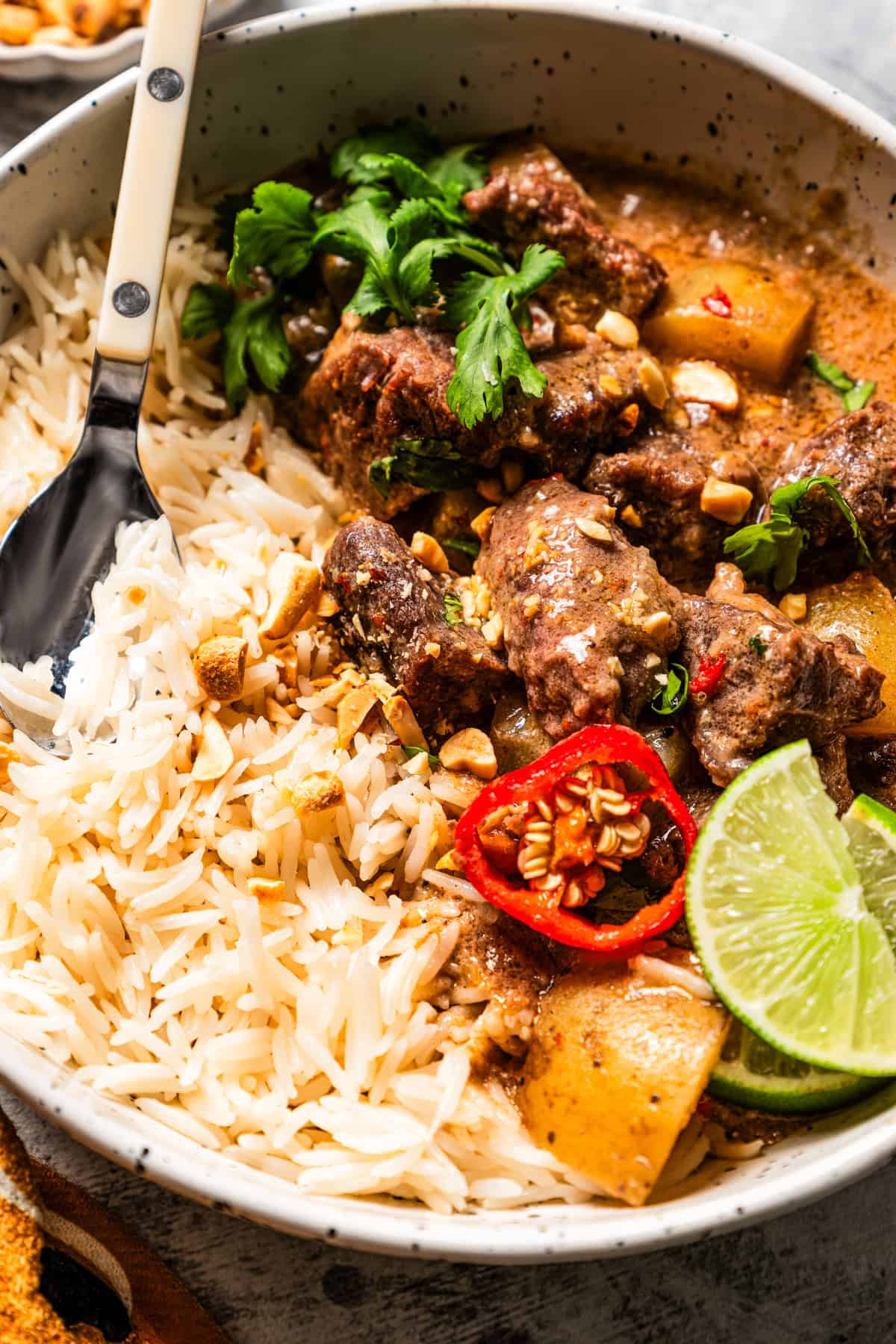
Storage and Reheating
- Refrigerate. Store the cooled leftover curry in an airtight container in the fridge for up to 4 days.
- Reheat. Warm the Massaman curry in a saucepan on the stove over medium heat. I much prefer it to the microwave, as the beef is less likely to turn rubbery.
- Freeze. You can freeze leftover curry for up to 3 months. Wait until it’s cool and then freeze it in an airtight container. Thaw the curry in the fridge before reheating.
Pin this now to find it later
Pin It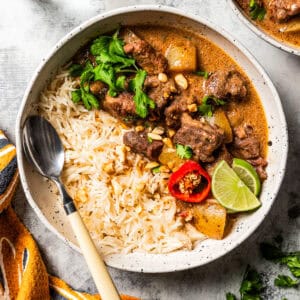
Massaman Curry
Ingredients
For the Curry Paste
- 1 teaspoon ground cumin
- ¾ teaspoon ground coriander
- 2 teaspoons ground ginger
- ¾ teaspoon white pepper
- ¼ teaspoon cardamom
- ¼ teaspoon cloves
- ½ teaspoon cinnamon
- pinch of salt
- 3 to 4 Fresno chilies, seeded and chopped
- 1½ tablespoons lemongrass paste
- 4 garlic cloves
- ½ red onion, diced
- 7 cilantro stems, just the stems
- ½ tablespoon miso paste
- 1 teaspoon brown sugar
- 1 tablespoon fresh lime juice
- water as needed
For the Curry
- 3 pounds cubed beef chuck
- 3 tablespoons cornstarch
- 2 teaspoons salt
- 1 teaspoon ground black pepper
- 3 tablespoons vegetable oil
- 14 ounces canned full fat coconut milk
- 2 cups beef broth
- 1 yellow onion, thinly sliced
- 1½ pounds baby gold potatoes, halved
- Roasted peanuts and chopped fresh cilantro, for garnish
Instructions
- Blend. Add the cumin, coriander, ginger, pepper, cardamom, cloves, cinnamon, salt, chilis, lemongrass paste, garlic, onion, cilantro, miso paste, brown sugar, and lime juice to a blender. Pulse until a paste forms. If the paste isn’t coming together, add water, one tablespoon at a time, as needed.
- Season the beef. In a medium-sized mixing bowl, toss together the beef, cornstarch, salt, and pepper.
- Brown the beef. In a large saucepan, heat the oil over medium-high heat. Add the beef and saute until nicely caramelized on all sides.
- Make it saucy. Stir in the coconut milk and the curry paste followed by the beef broth. Stir until well combined.
- Simmer. Turn the heat to low, stir in the onion, and cover the saucepan. Simmer for 2 hours.
- Add the potatoes. Stir in the potatoes, cover the pan again, and cook for 25 minutes or until the potatoes are fork-tender.
- Serve. Serve warm over steamed white rice garnished with peanuts and cilantro.
Equipment
Nutrition
Nutritional info is an estimate and provided as courtesy. Values may vary according to the ingredients and tools used. Please use your preferred nutritional calculator for more detailed info.
How to Make Massaman Curry Paste
The base of many curries starts with a fragrant paste made by blending spices and aromatics. Once you’ve gathered your ingredients, the paste comes together quickly in the blender:
- Combine. Add all of your curry paste ingredients to a blender or food processor. If you’re old school, you can also get out your pestle and mortar for this.
- Blend. Blend or grind the ingredients to form a smooth paste. If the mixture needs a little help coming together, you can add a spoonful of water as needed.
You can also make this Massaman curry with store-bought curry paste. It won’t have quite the same freshness and flavor, but it’ll do in a pinch. Refer to the package directions if you need to add your store-bought paste at a different point in the cooking process.
How To Make Massaman Curry
Are you drooling yet? Because I am. With your curry paste set to go, it’s time to get this curry saucy and simmering.
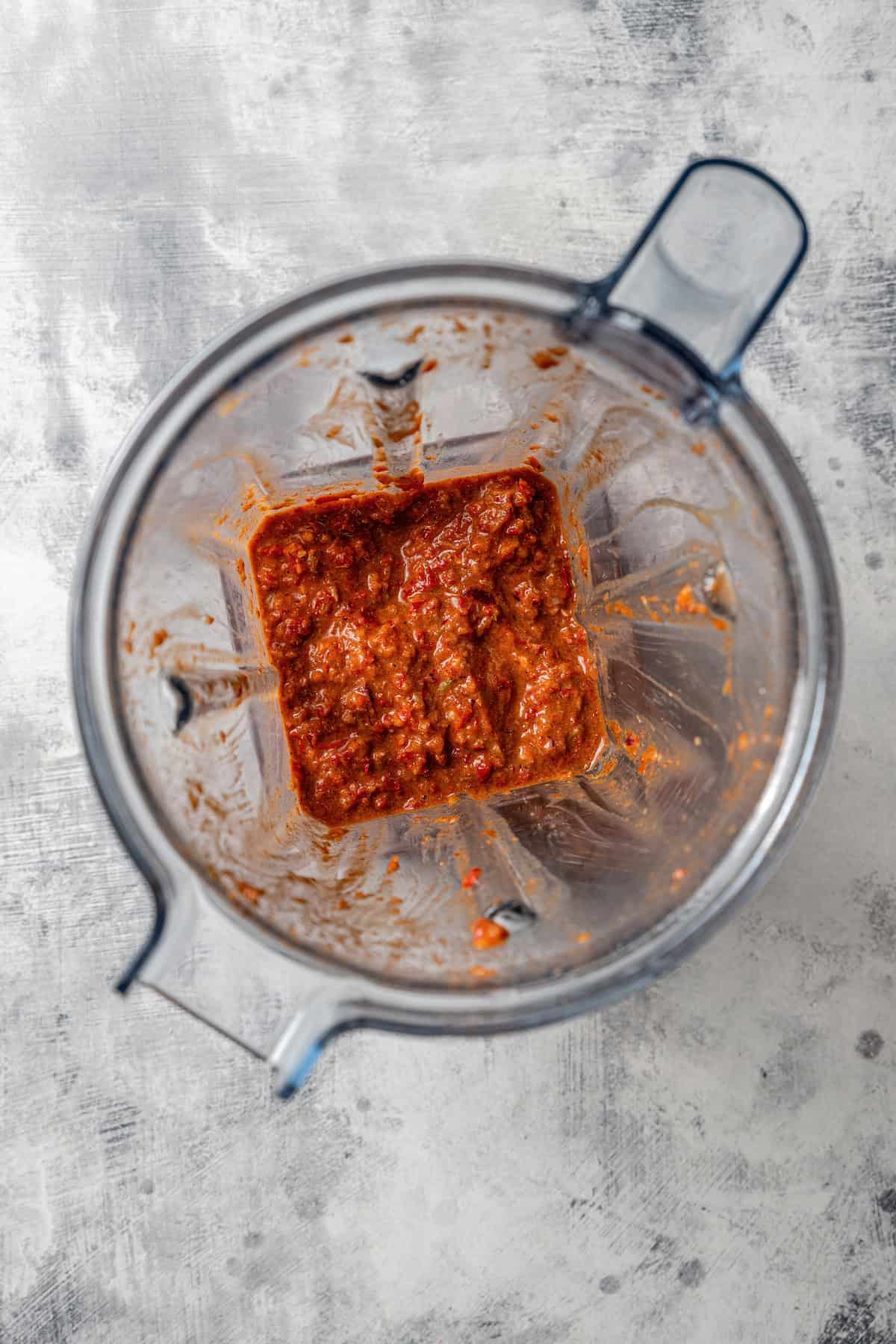
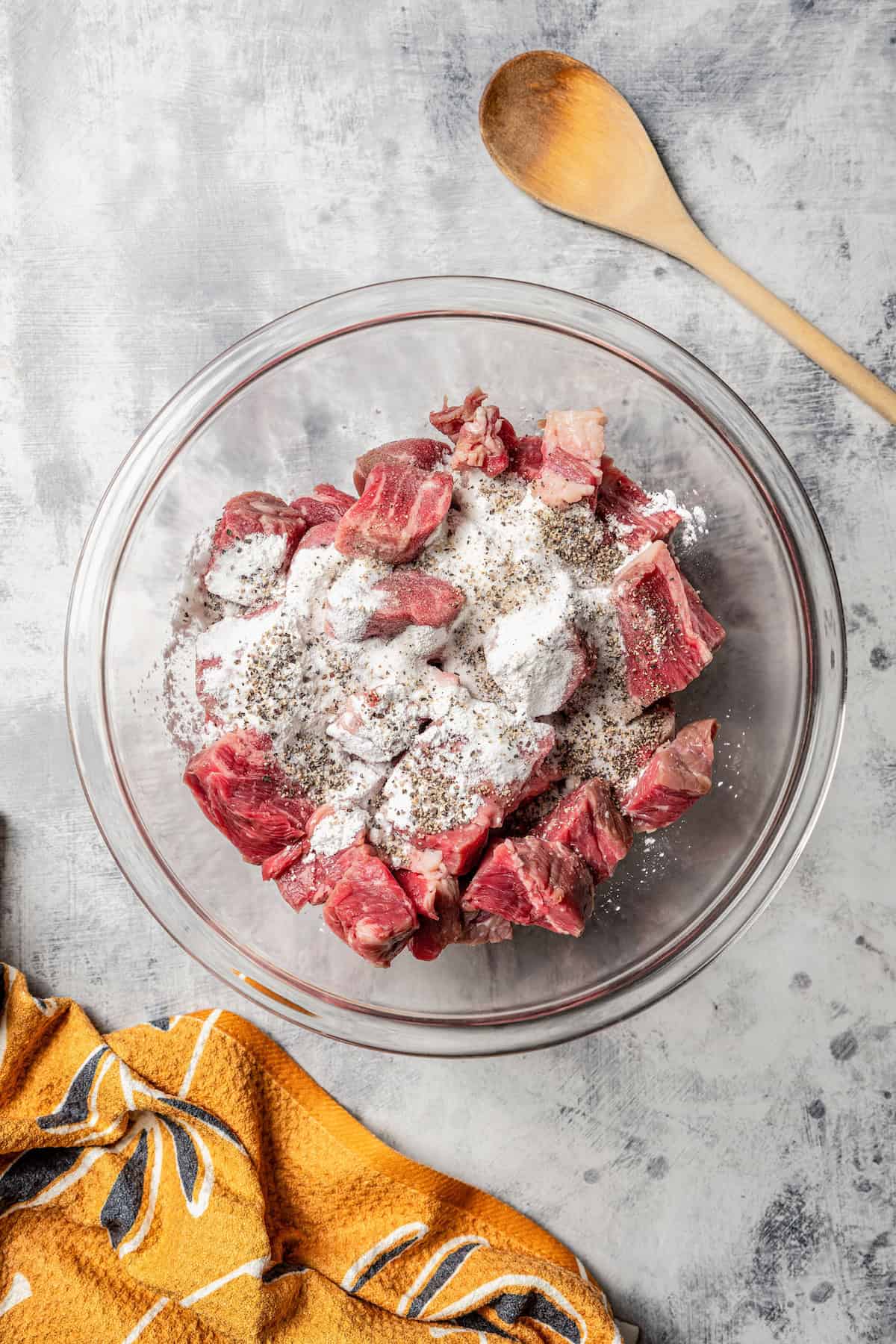
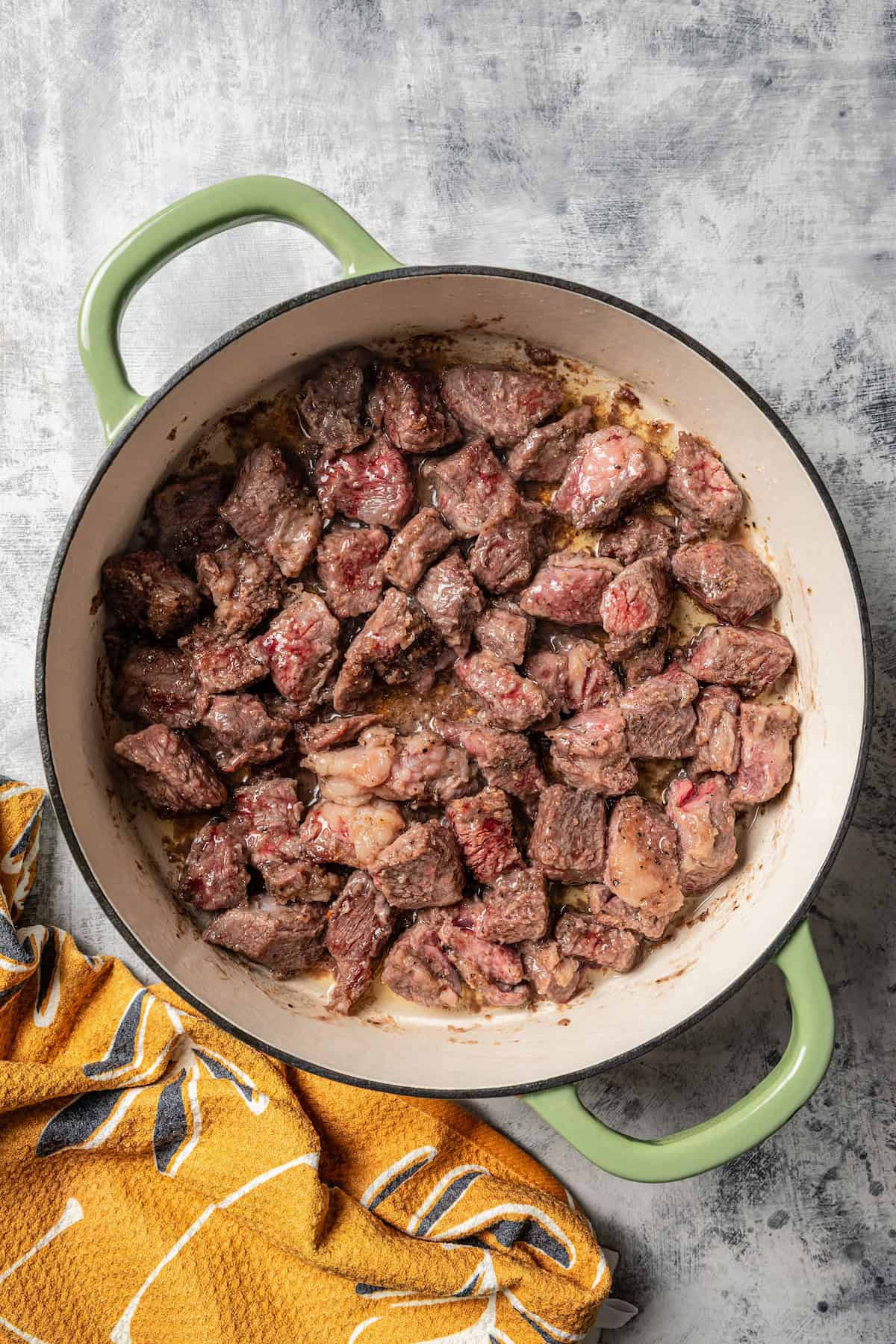
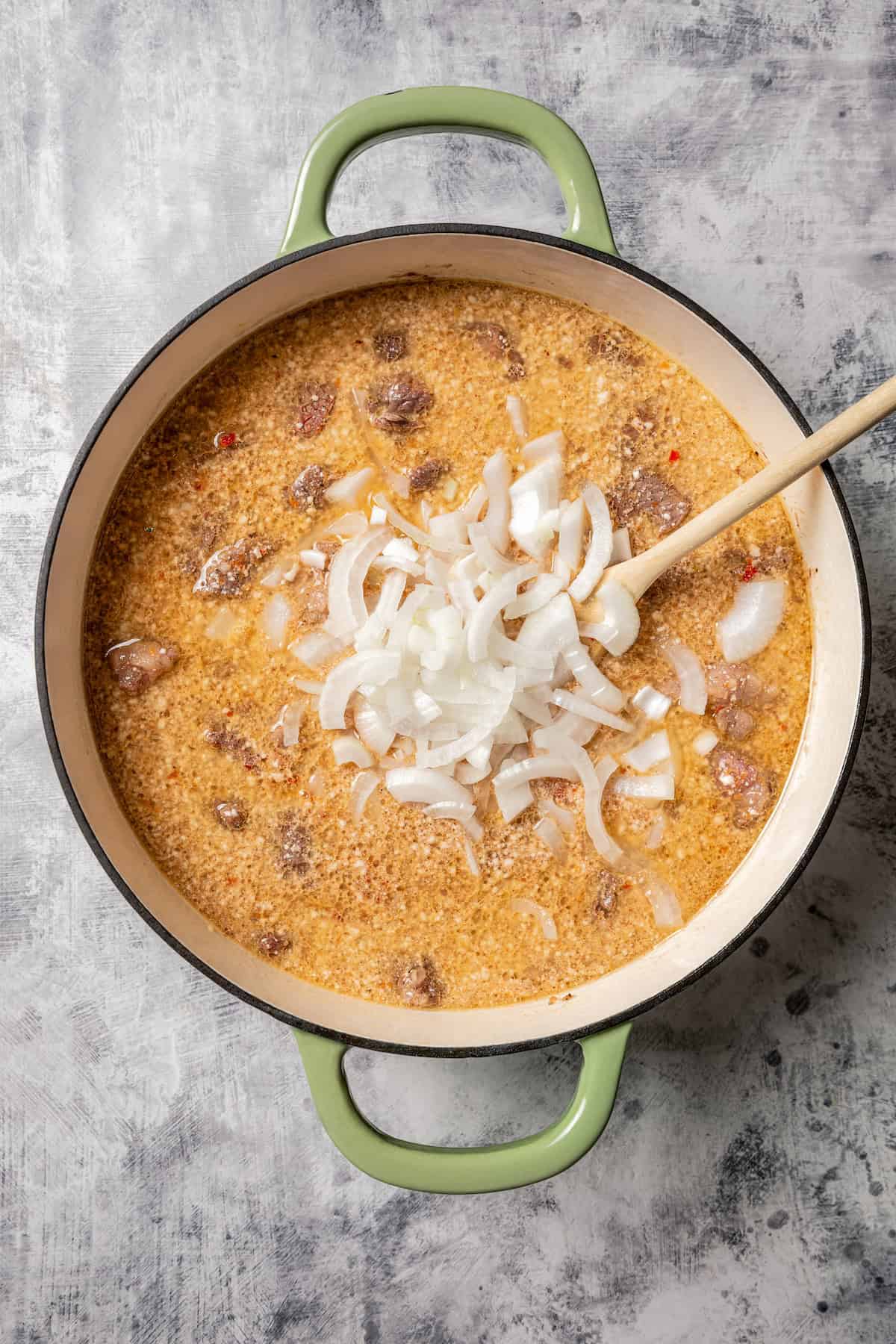
- Make the curry paste. See above. I sometimes double the recipe and store the extras in a tight-lidded jar. Homemade curry paste lasts up to 4 weeks in the fridge, or 3 months in the freezer!
- Prepare the beef. Meanwhile, you’ll velvet the beef in a bowl with cornstarch, salt, and pepper. Afterward, sear the beef cubes over medium-high heat until they’re nice and caramelized.
- Combine and cook. Add your coconut milk, curry paste, and beef broth to the pot and give that a good stir. Lower the heat and add the onion. Then, let the curry simmer, covered, for 2 hours.
- Add the potatoes. Finally, add your potatoes in the last 25 minutes so that they can cook through.
- Serve. Serve your warm and fragrant Massaman curry over rice topped with peanuts and fresh cilantro. See below for more ideas.
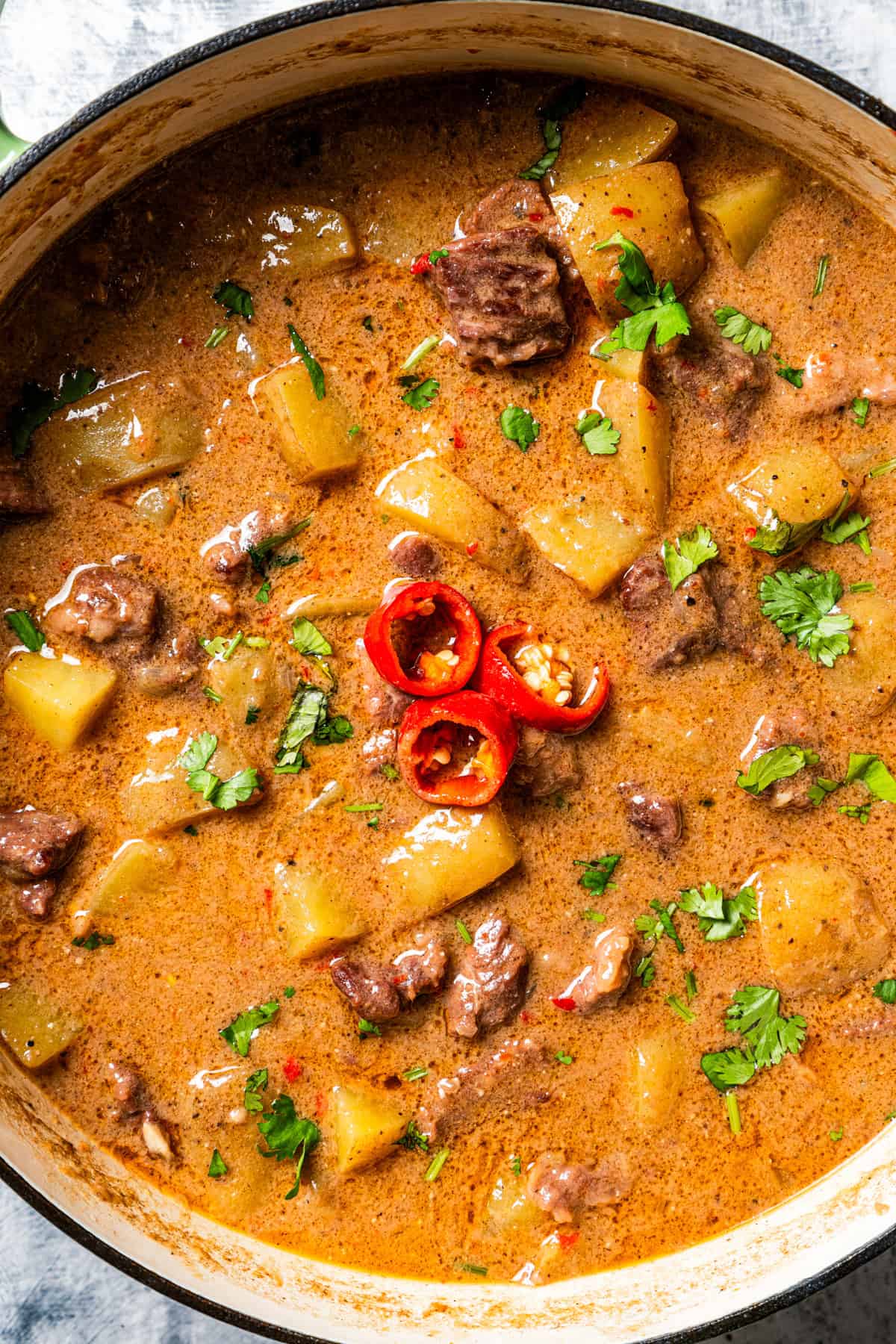









I generally don’t eat meat. Would it work out in my favor to substitute tofu for the beef?